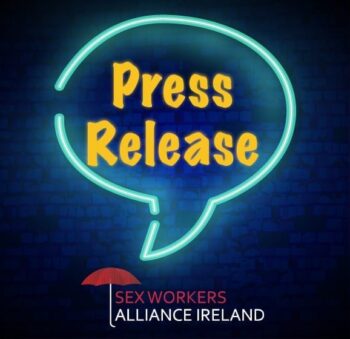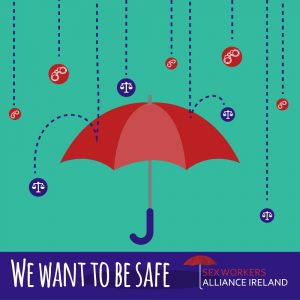Liam Vickers preyed on a vulnerable trans woman and was enabled by our recently changed laws
Kate McGrew, director of Sex Workers Alliance Ireland (SWAI) says “The Sex Workers Alliance Ireland (SWAI) applauds this brave sex worker who reported the crime and we call for an end to the criminalisation and stigmatisation that leaves this vulnerable population in the shadows.”
She continues “This occurred immediately in the wake of increased criminalisation of both this worker and her client. The change in law created an environment wherein our vulnerability was highlighted in the media, without providing any new protections for us whatsoever. The law increased criminalisation of people co-working, under “brothel-keeping” legislation, distancing us from authorities, and also forcing us to work alone if we were trying to work within legal parameters. Since the law changed in 2017 we have seen a 92% increase in violent crimes against us. This is yet another example.
SWAI calls for full decriminalisation of the sex industry. Were Ireland to repeal the criminalisation of brothel-keeping and the purchase of sex, we would see more sex workers engaging with the justice system. We will see better outcomes for sex workers when we have legal and vetted options within the industry. We will see better outcomes for sex workers as society begins to acknowledge the reality that sex work is an economic activity, and therefore sex workers are labourers deserving of protections afforded to all workers. Irish culture is moving in this direction, it is time that this be reflected at state and policy levels.
In the 2017 incident, the escort was obviously the victim of a violent crime. Yet, in Vickers’ statement the court heard that he brought the knife that he used to stab the victim because it was he himself who was afraid of “being robbed”. Sex workers are forced to work alone by our laws, which increased penalties for so-called brothel-keeping in 2017.
Sex workers are perpetually bound by the dichotomy of victim and criminal identities. Depending on the moment, either will be deployed against us and used to erase our perspective of our own experiences.”


 Both sex workers and Gardaí have known about these criminals for some time but sex workers refuse to contact the Garda because trust in Gardaí is at an all-time low since the law changed in 2017.
Both sex workers and Gardaí have known about these criminals for some time but sex workers refuse to contact the Garda because trust in Gardaí is at an all-time low since the law changed in 2017.